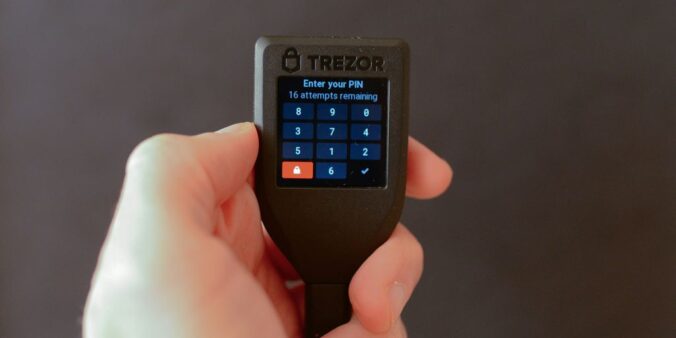Hot and cold wallets are essential tools for securing your cryptocurrency assets, but they function in fundamentally different ways. Understanding these differences is crucial for choosing the right type of wallet for your needs. This article will delve into the definitions, functionalities, and security implications of both hot and cold wallets, helping you make an informed decision.
Key Takeaways
- Hot wallets are software-based and connected to the internet, making them suitable for regular transactions but more vulnerable to hacks.
- Cold wallets are hardware-based and offline, providing higher security for long-term storage but requiring more technical expertise to set up.
- The choice between hot and cold wallets depends on factors like transaction frequency, amount of cryptocurrency held, and the user’s technical skills.
- Combining hot and cold wallets can offer optimal security by diversifying storage methods and following best practices.
- Understanding the technological differences between hot and cold wallets, such as software vs. hardware and interaction with DApps, is crucial for making an informed choice.
Definition and Functionality of Hot Wallets
Hot wallets are digital wallets that are typically connected to the internet. They are software installed on devices like smartphones or laptops. The defining feature of a hot wallet is that it generates your seed phrase online and stores your private keys online too. This frequent online presence makes transacting straightforward and convenient.
Internet Connectivity and Accessibility
A hot wallet serves as an interface for completing cryptocurrency transactions. It is in charge of recording your transactions on the decentralized public blockchain ledger. Two critical components of a hot wallet are the private and public keys, which are made up of a cryptographic string of letters and numbers and are responsible for successful crypto deals with your wallet.
Common Use Cases
Hot wallets are online solutions that provide several functionalities, including storing, sending, and receiving tokens and managing and viewing all available tokens in one place. You can access a hot wallet through internet-enabled devices like mobile phones, tablets, and laptops. The primary appeal of hot wallets is the ease of sending and receiving crypto on demand.
Advantages and Disadvantages
Advantages:
- Easy access and convenience for regular transactions.
- Quick and efficient for sending and receiving cryptocurrencies like bitcoin and ethereum.
- User-friendly interfaces.
Disadvantages:
- Higher vulnerability to hacks due to constant internet connectivity.
- Less secure for long-term storage of large amounts of cryptocurrency.
Hot wallets are widely adopted by cryptocurrency users because they make it easier to transfer and receive cryptocurrency.
Definition and Functionality of Cold Wallets
Offline Storage and Security
Cold wallets, also known as cold storage solutions, are offline storage methods to secure cryptocurrencies from online threats. These wallets are completely disconnected from the internet, often taking the form of physical devices like thumb drives that store your private keys offline. This offline storage makes cold wallets less vulnerable to online attacks, providing a higher level of security for your assets.
The purpose of a true cold wallet is to act as a vault for the bulk of your crypto, isolating it from all potential risks. You can think of it as a “savings” account, where you keep the majority of your funds but don’t actively transact.
Common Use Cases
Cold wallets are primarily used for long-term storage of cryptocurrencies. They are ideal for individuals who do not need to access their funds frequently and prefer to keep their assets in a highly secure environment. These wallets work in tandem with active wallets to execute transactions when necessary.
Advantages and Disadvantages
Advantages:
- High level of security due to offline storage
- Reduced vulnerability to online attacks
- Ideal for long-term storage
Disadvantages:
- Less convenient for frequent transactions
- Requires physical security measures to protect the device
- Can be more complex to set up and use compared to hot wallets
Security Implications of Hot and Cold Wallets

Vulnerability to Hacks
Hot wallets are always connected to the internet, making them more susceptible to hacking attempts. Cold wallets, on the other hand, are offline, significantly reducing the risk of unauthorized access. This fundamental difference in connectivity is a key factor in their security profiles.
Physical Security
While cold wallets offer enhanced digital security, they require robust physical security measures. Storing a cold wallet in a secure location is crucial to prevent theft or loss. Conversely, hot wallets, being digital, do not face physical security risks but are more vulnerable to cyber threats.
User Responsibility
The security of both hot and cold wallets heavily depends on the user’s practices. For hot wallets, users must ensure strong passwords and enable two-factor authentication. For cold wallets, safeguarding the physical device and backup phrases is essential. User diligence is paramount in maintaining the security of their crypto assets.
The choice between hot and cold wallets should be guided by the user’s specific needs and their ability to manage the associated security responsibilities.
Choosing the Right Wallet for Your Needs

Frequency of Transactions
When deciding between hot and cold wallets, consider how often you plan to transact with your cryptocurrency. Hot wallets are ideal for frequent transactions due to their ease of access and internet connectivity. On the other hand, cold wallets are better suited for long-term storage and infrequent transactions.
Amount of Cryptocurrency Held
The amount of cryptocurrency you hold can also influence your choice. If you hold a significant amount of crypto, a cold wallet is generally recommended for its enhanced security features. For smaller amounts, a hot wallet may suffice, offering a balance between security and convenience.
Technical Expertise Required
Your level of technical expertise is another crucial factor. Hot wallets are typically easier to set up and use, making them suitable for beginners. Cold wallets, while offering higher security, may require more technical knowledge to manage effectively.
Ultimately, the best wallet for you will depend on what you need and what’s most important to you. If security is your top priority, choose a cold wallet. A hot wallet might be better if you care more about convenience and ease of use.
Combining Hot and Cold Wallets for Optimal Security

Combining hot and cold wallets can provide a balanced approach to managing your cryptocurrency assets. A hot wallet can be used for regular transactions and a small amount of cryptocurrencies, while a cold wallet can store larger amounts for the long term. This way, the convenience of a hot wallet can be enjoyed while benefiting from the security of a cold wallet.
Technological Differences Between Hot and Cold Wallets

Software vs Hardware
Hot wallets are typically software applications that run on your computer or phone, providing easier access to your cryptocurrency. In contrast, cold wallets are hardware devices that keep your data offline, offering enhanced security. This fundamental difference impacts their usability and security features.
Setup Complexity
Setting up a hot wallet is generally more user-friendly and straightforward, making it accessible for beginners. On the other hand, cold wallets require more technical knowledge for setup, which can be a barrier for some users. Here is a quick comparison:
| Feature | Hot Wallets | Cold Wallets |
|---|---|---|
| Ease of Setup | Simple and quick | Requires technical knowledge |
| Accessibility | High (Internet-connected) | Low (Offline) |
Interacting with DApps and Smart Contracts
Hot wallets are more versatile for interacting with decentralized applications (DApps) and executing smart contracts. Cold wallets, while highly secure, offer limited functionality in this regard. This makes hot wallets a preferred choice for users who frequently engage with blockchain-based applications.
The choice between hot and cold wallets often depends on the user’s specific needs and technical expertise. While hot wallets offer convenience, cold wallets provide unparalleled security.
Understanding the technological differences between hot and cold wallets is crucial for anyone involved in cryptocurrency. Hot wallets offer convenience and speed, while cold wallets provide enhanced security for long-term storage. To dive deeper into the pros and cons of each type, visit our website for comprehensive insights and expert advice.
Conclusion
In summary, both hot and cold wallets serve essential roles in the realm of cryptocurrency storage, each with its unique advantages and disadvantages. Hot wallets offer convenience and ease of access, making them ideal for regular transactions and active trading. However, their constant connection to the internet makes them more susceptible to cyber threats. On the other hand, cold wallets provide a higher level of security by keeping private keys offline, making them suitable for long-term storage and safeguarding significant amounts of cryptocurrency. Ultimately, the choice between a hot and a cold wallet depends on individual needs and preferences. For many users, a combination of both types of wallets may offer the best balance between accessibility and security.
Frequently Asked Questions
What is a hot wallet?
A hot wallet is a type of cryptocurrency wallet that is connected to the internet. It is typically software-based and used for regular transactions due to its ease of access.
What is a cold wallet?
A cold wallet is a type of cryptocurrency wallet that is not connected to the internet. It is usually hardware-based and used for secure, long-term storage of cryptocurrencies.
What are the main advantages of hot wallets?
Hot wallets are highly accessible and convenient for frequent transactions. They are generally user-friendly and easy to set up.
What are the main advantages of cold wallets?
Cold wallets offer higher security as they are offline and less vulnerable to hacks. They are ideal for long-term storage of large amounts of cryptocurrency.
Can I use both hot and cold wallets?
Yes, many users opt to use both types of wallets to balance convenience and security. This strategy is known as diversifying your storage.
Which wallet should I choose if I frequently transact with cryptocurrencies?
If you frequently transact with cryptocurrencies, a hot wallet may be more suitable for you due to its ease of access and convenience.



Leave a Reply